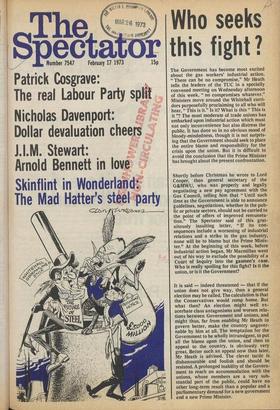Who seeks this fight?
The Government has become most excited about the gas workers' industrial action. "There can be no compromise," Mr Heath tells the leaders of the TUC in a specially convened meeting on Wednesday afternoon of this week, "no compromises whatever." Ministers move around the Whitehall corridors purposefully proclaiming to all who will hear, " This is it." Is it? What is this" This is it "? The most moderate of trade unions has embarked upon industrial action which must not only inconvenience but also distress the public. It has done so in no obvious mood of bloody-mindedness, though it is not surprising that the Government should seek to place the entire blame and responsibility for the crisis upon the union. But it is difficult to avoid the conclusion that the Prime Minister has brought about the present confrontation.
Shortly before Christmas he wrote to Lord Cooper, then general secretary of the G&MWU, who was properly and legally negotiating a new pay agreement with the Gas Council, telling him that " Until such time as the Government is able to announce guidelines, negotiations, whether in the public or private sectors, should not be carried to the point of offers of improved remuneration." The Spectator said of this gratuitously insulting letter, " If its consequences include a worsening of industrial relations and a strike in the gas industry, none will be to blame but the Prime Minister." At the beginning of this week, before industrial action began, Mr Macmillan went out of his way to exclude the possibility of a Court of Inquiry into the gasmen's case. Who is really spoiling for this fight? Is it the union, or is it the Government?
It is said — indeed threatened — that if the union does not give way, then a general election may be called. The calculation is that the Conservatives would romp home. But what then? An election might well exacerbate class antagonisms and worsen relations between Government and unions, and might thus, far from enabling Mr Heath to govern better, make the country ungovernable by him at all. The temptation for the Government to be wholly intransigent, to put all the blame upon the union, and then to appeal to the country, is obviously very great. Better such an appeal now than later, Mr Heath is advised. The clever tactic is dishonourable and foolish and should be resisted. A prolonged inability of the Government to reach an accommodation with the unions, whose members are a very substantial part of the public, could have no other long-term result than a popular and a parliamentary demand for a new government and a new Prime Minister.
































